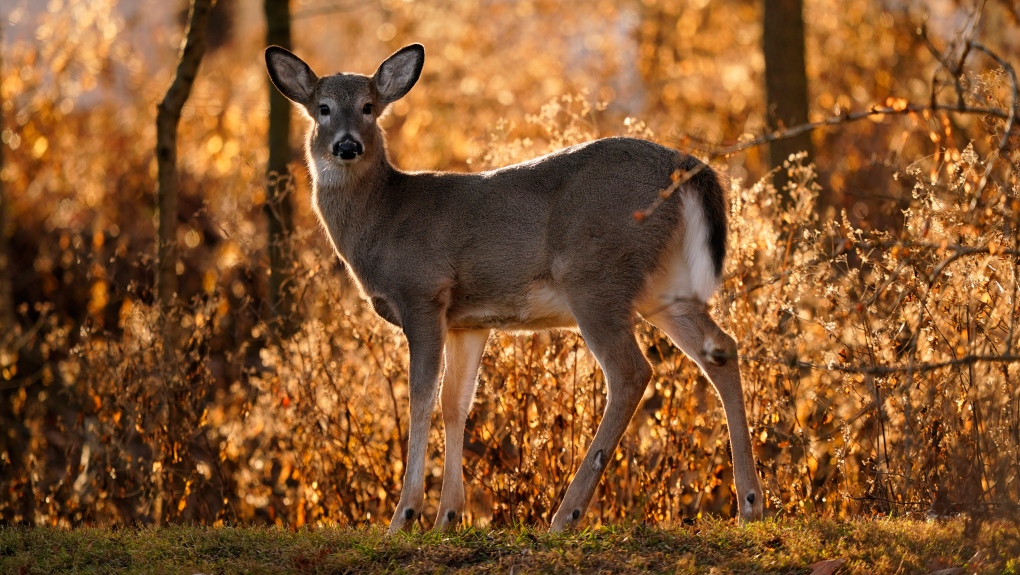Hunters asked to submit deer samples to help combat wasting disease
 A young white tail deer looks up from a hillside, Wednesday, Dec. 22, 2021, in Marple Township, Pa. (AP Photo/Matt Slocum)
A young white tail deer looks up from a hillside, Wednesday, Dec. 22, 2021, in Marple Township, Pa. (AP Photo/Matt Slocum)
The Government of Ontario is asking hunters to submit deer samples as part of its chronic wasting disease (CWD) surveillance program to allow for early detection of the disease.
"Hunter samples from harvested deer are critical in Ontario's efforts to detect CWD, a fatal, untreatable brain disease that affects members of the deer family, including white-tailed deer, elk, moose and caribou," the province said in a news release.
"It has not been found in Ontario but has been detected in all five U.S. states bordering Ontario, as well as Alberta, Saskatchewan, Manitoba, and Québec, so it’s important we remain vigilant and take action to monitor for CWD."
The surveillance is targeted to three regions of the province, mainly in the southern and eastern areas, between October and December.
"During the fall hunt, wildlife research technicians will be canvassing the surveillance areas and asking hunters’ permission to remove a small amount of tissue from the deer head for analysis," the province said.
"Sampling will not prevent hunters from consuming the meat or having the head mounted."
In addition, hunters can take the heads of harvested deer to special freezer depots. There is one in northern Ontario -- Brushey’s in Powassan. The other sites are listed here.
"Hunters submitting a deer head are asked to provide their contact information, the date and general location of harvest," the release said.
"Fawns under one year of age will not be tested as this disease is unlikely to be detected in young animals."
Hunters that see a deer, elk or moose showing signs of CWD, such as severe loss of body weight, tremors, stumbling, or lack of coordination, are asked to report it to the Canadian Wildlife Health Cooperative at 1-866-673-4781 or Ministry of Natural Resources and Forestry's Natural Resources Information and Support Centre at 1-800-667-1940.
CTVNews.ca Top Stories

'They needed people inside Air Canada:' Police announce arrests in Pearson gold heist
Police say one former and one current employee of Air Canada are among the nine suspects that are facing charges in connection with the gold heist at Pearson International Airport last year.
House admonishes ArriveCan contractor in rare parliamentary show of power
MPs enacted an extraordinary, rarely used parliamentary power on Wednesday, summonsing an ArriveCan contractor to appear before the House of Commons where he was admonished publicly and forced to provide answers to the questions MPs said he'd previously evaded.
Leafs star Auston Matthews finishes season with 69 goals
Auston Matthews won't be joining the NHL's 70-goal club this season.
Trump lawyers say Stormy Daniels refused subpoena outside a Brooklyn bar, papers left 'at her feet'
Donald Trump's legal team says it tried serving Stormy Daniels a subpoena as she arrived for an event at a bar in Brooklyn last month, but the porn actor, who is expected to be a witness at the former president's criminal trial, refused to take it and walked away.
Why drivers in Eastern Canada could see big gas price spikes, and other Canadians won't
Drivers in Eastern Canada face a big increase in gas prices because of various factors, especially the higher cost of the summer blend, industry analysts say.
Doug Ford calls on Ontario Speaker to reverse Queen's Park keffiyeh ban
Ontario Premier Doug Ford is calling on Speaker Ted Arnott to reverse a ban on keffiyehs at Queen's Park, describing the move as “needlessly” divisive.
'A living nightmare': Winnipeg woman sentenced following campaign of harassment against man after online date
A Winnipeg woman was sentenced to house arrest after a single date with a man she met online culminated in her harassing him for years, and spurred false allegations which resulted in the innocent man being arrested three times.
Woman who pressured boyfriend to kill his ex in 2000s granted absences from prison
A woman who pressured her boyfriend into killing his teenage ex more than a decade ago will be allowed to leave prison for weeks at a time.
Customers disappointed after email listing $60K Tim Hortons prize sent in error
Several Tim Horton’s customers are feeling great disappointment after being told by the company that an email stating they won a boat worth nearly $60,000 was sent in error.
































